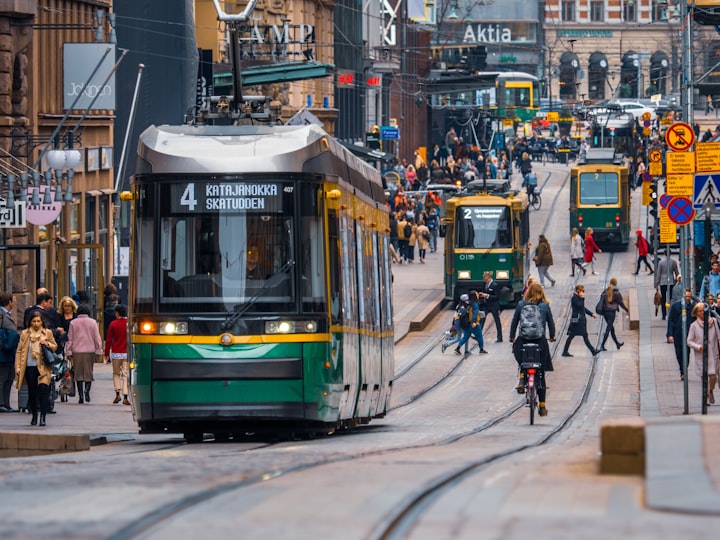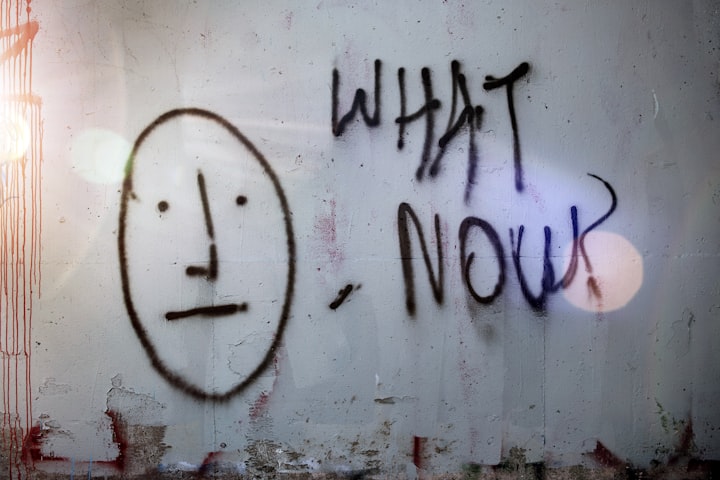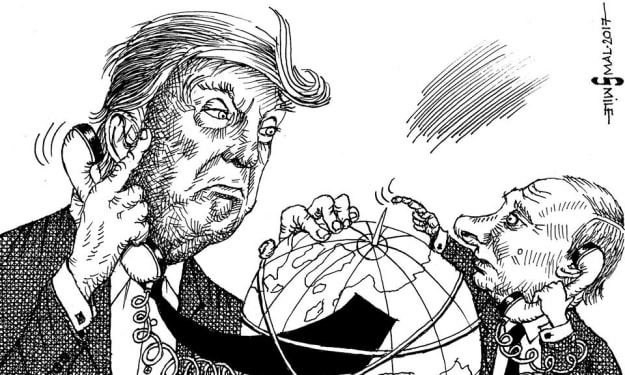Hey Joe, This Is Life in an Entitlement Society
What it actually looks like to be born in a society where people are entitled to a future.

Senator Joe Manchin, in the negotiations on passing President Biden’s infrastructure bill (backed by progressives and, well, everybody else in the Democratic party) spoke about not wanting the United States to turn into an entitlement society. The expression sounded as typically and cynically out-of-touch as one would expect from a rich man who made a fortune off coal while trying to stop any meaningful climate change legislation from passing.
But it’s also funny to me, as an entitled Finnish person, to read about just how scary people in the US think a society with a basic social safety net is.
Why do I even know who Joe Manchin is? I wish I didn’t.
But here’s a true horror story about a life of entitlement, inspired by the senator from West Virginia.
Setting up a life of entitlement
I was born in a public hospital, the second of three daughters, in 1985. My parents didn’t have health insurance, but they didn’t have to pay a dime for my mother’s hospital stay.
As soon as I was born, the monthly child benefit the government pays parents until the child is 17 was increased. When my little sister came along, this monthly amount was increased even further. In Finland today, the benefit is worth about €95 for your first child, €105 for your second, and €134 for your third, increasing gradually until the fifth. Apart from this benefit, there’s also a housing allowance available for low-income families.
Oh, and my parents of course also received the famous Finnish baby boxes and had all the periodic check-ups, for free, at a local clinic. And free healthcare for the child and mother is not just for the first years of life but, you know, forever.
Normally, parents can take 11 months of leave to stay at home with their child, and this time can be split between the two parents. My parents were small business owners and my father wasn’t around as much as my mother would have needed him to be, so my mother had to keep me with her at work for the first months. At six months old, I was sent to a public kindergarten, where I met one of my best friends. She was from a better family than I was, with two working parents and two adult sisters who would go on to become doctors in chemistry and medicine, but we all shared the same public institutions. My friend now lives in Biarritz, France, but we still speak on the phone every week, 35 years later.
When I was six, my father’s reckless spending and alcoholism finally made my mother decide enough was enough. She divorced him, just as their businesses went bankrupt.
My mother was lucky in getting us a two-bedroom apartment in a recently remodeled building owned by the city, with apartments destined for low-income families. Some of these were single parents, some chronically unemployed families, some alcoholics and drug addicts. Two years later, we upgraded the apartment within the same building complex, to a bigger one.
I spent the rest of my adolescence in a beautiful, four-bedroom apartment on the top floor with large windows overlooking the forest. The peace of that home helped overlook the fact that most of the families on my street were not as happy as mine. Most girls got their first abortions before age 15, and many boys were drug addicts by 18.
Entitled schooling
I went to school five minutes from my home. If I lived farther away, I would have qualified for a school transport subsidy, but luckily I was able to walk to school on my own every day.
It was very safe, even though I lived on the wrong side of town. There was no crime in those days, really, probably in part because there was no extreme poverty. The Finnish prison system is also not designed for profit, and is more focused on rehabilitating people to be a productive part of society than on punishment. This lowers recidivism and makes cities safer. Of course, the United States is the opposite of this model.
My school was one of the worst in the city, and it had a lot of people from poorer neighborhoods like mine. But because everybody goes to public schools, it also had kids from solidly upper-middle-class families, which allowed me to make friends with kids from different backgrounds. Being friends with kids who weren’t of the same social status gave me a new social reference, and allowed me to stay away from the ones who were heading for a life of alcohol and bad choices.
At school, we all got supplies given to us. Pens, notebooks, textbooks, all for free. We weren’t allowed to make any markings in the textbooks because they were recycled to another person the following year. Finns are not wasteful, after all. We did all the work in our notebooks, and when we needed a new one we only needed to ask the teacher. They didn’t buy any of the supplies from their own salaries, of course, like teachers sometimes have to do in the US. It was all budgeted and paid for by the state.
In the school cafeteria, you couldn’t buy any food. There were no burgers or pizza there, but healthy, balanced meals instead. The menu was developed by the city council, and the food was free for everybody until the end of high school.
We had a nurse and a dentist in our school. Every year, we got called in for our scheduled appointments, all free of charge. We also got our vaccines administered at the school using the same system.
Oh, and we also had sexual education in school. Accurate, physiological information to keep us safe. No talk of abstinence, but a recognition of the fact that teenagers will have sex, as they have since the beginning of time.
In high school, tuition and food were still free, although notebooks and other supplies weren’t. What was helpful was that when my mother stopped getting the child benefit for us at age 17, we started receiving a small student benefit.
Had I decided to pursue higher education in Finland, I would have had to take an entrance exam to try to get into a university. There, tuition doesn’t cost the students a dime. Books and food aren’t free anymore, though, so the fact that the student benefit increases for higher education is incredibly helpful. There’s also a housing benefit for those who leave their homes to live on their own.
I didn’t go to university in Finland. I wasn’t sure what I wanted to study back then, but I knew that all the fields that would have interested me had really low entry rates. Studying for an exam for two years to compete for one of twenty spots, when there are 500 other applicants? No, thank you. I’m simply not that disciplined, or that bright. But while I might not be an academic prodigy, I’m smart enough to find a loophole when I need one.
So, I moved to Barcelona, and then Buenos Aires, where I finally started studying. And guess what? Finland gave me the same student benefits while studying abroad. This amounted to around €500 per month, through the five years of my degree and another year for my MA. Free money you don’t have to pay back, just to incentivize people to study. If this isn’t enough — and it usually isn’t for students living in Helsinki—you can also opt for a low-interest student loan of up to €440 per month.
The best thing about all of these benefits is that getting them doesn’t mean you’re poor or an outcast. I wasn’t a stamp that would make you stand out in school, because of a free lunch program or books paid for by the government.
There’s no social stigma attached to getting things for free, because everybody does.
Is it worth it?
This is not to say that everybody gets an even start. Finland is still far from perfect, and there’s always push for dialing down some of the benefits I’ve mentioned here. We still see the effects of racism, sexism, and poverty. Many of the kids living on my street had a much rougher life, because they didn’t have good references in their life like I did, with my mother and my best friends.
I was always the poorer kid in my friend group. When all my friends got a specific brand of sneakers, I didn’t. It was in part because I was that kid who always wanted to be different as a form of protest, but it was also because we didn’t have money. That’s why I started working at 15.
But none of my friends were rich. None of our parents had college degrees. None of them had saved up tens of thousands of dollars for their kids’ education, yet still, most of my friends did finish university degrees, some of them several.
When most people can’t afford to live because of a fear of affecting the benefits of the very few, the system is in serious decay.
I was also lucky to have the loving home I did. My parents weren’t intellectuals, they were photographers with a small business that went bankrupt when they were barely past 30. But I was read to a lot when I was a kid. When I discovered the magic of reading myself, at the age of five, my mother would start taking me to the wonderful, luminous public library of the city of Lahti, always well-maintained with public resources and up to date with the newest releases. This place was my church. Over the years, she would haul mountains of books from their selection to my home and back without ever complaining (except when our fat golden retriever picked up a habit of chewing them up), which definitely influenced me becoming a writer. Both of my parents were present when I needed them, and I was always able to talk to my mother about anything I needed.
My mother had a small business, so she didn’t have many of the benefits of someone working for a bigger company, such as annual vacations. She worked, and worked, changed careers a couple of times, even reinvented herself and started a new business and got a degree when she was over 50. Only as she was approaching 60 did she reach the point of not being worried about making her mortgage payments each month.
But thanks to the basic social safety net the Finnish model offered, her children were all able to finish high school, get good jobs, travel the world and, in my case, get a master’s degree and a nice government job in a faraway country. (Me hating the job and wanting to leave it to become a full-time writer is a story for another time.) Both my sisters got nice jobs in finance.
As for my father, he spent decades out of work after the bankruptcy, but he had a pretty nice life with his long-term partner. He died at 60 after a five-year battle with cancer, but he had free health care until the very end and was never treated like trash by society. He had some problems, but he was still a person, still in possession of basic human rights. In the United States, as a non-productive member of society he would probably have been forgotten.
Maybe you don’t think I am enough of a productive member of society to justify the expense of all this, either. Maybe you think I, the middle child of a single mother and an alcoholic father, should have been left on my own to make my way through the world on just my wits. If I was smart enough I would have crawled my way out of poverty and gotten a scholarship to go to college from some billionaire-funded organization, and if I wasn’t, well, then I must have deserved it.
That’s the American way, isn’t it?
But the people who manage to do that are too few for it to justify the economic model. When most people can’t afford to live because of a fear of affecting the benefits of the very few, the system is in serious decay.
Entitled to a future
Outside of the United States, we often share memes or viral articles on the ridiculous things Americans normalize. Holding three jobs to pay the rent? No annual vacation or maternity leave? Getting into crippling debt because you had to get emergency surgery? Not being able to pay for life-saving medicine because of your government not regulating greedy corporations? Big companies not paying federal taxes and making major profits, while their workers are overworked and underpaid?
The American fear of socialism would be ridiculous if it wasn’t so destructive for real people, and if it didn’t affect so many real lives.
While “moderates” like Manchin may be good at finding euphemisms to spark up the old Red Scares, I can honestly tell you that socialism is not all that bad.
An entitlement society like the Finnish one functions on the premise that everyone is entitled to a future. This ideal may not be perfect, and the world may not treat everyone fairly. But if you’re born in a society like this, you have a much better chance of living a healthy and happy life.
When Republicans try to fire up their base before an election with references to dangerous socialism, they use examples such as Cuba or Venezuela. But the reason for the poverty and political instability of these countries isn’t socialism.
Socialism, when combined with stable institutions and capitalism as in the Nordic social democracies, is actually a pretty functional model. It introduces state controls, taxes and social security, while still allowing for a relatively free market. This helps make sure that everybody has a shot at doing well in life.
This kind of a model is obviously much cheaper to implement in a country with 5 million people, like Finland, than in the United States. But Finland is also not the biggest economy in the world, with some of the most important companies in the world. The United States is. Call me crazy, but I think a part of all that money should be destined to make people’s lives better, not to send billionaires on vacation to space.
And no, socialism doesn’t destroy entrepreneurship. Just look at Nokia, or Rovio, the creator of Angry Birds. We might not be talking about companies the size of Apple or Facebook, but for a small country, I’d say Finland has done well for itself (and isn’t destroying global democracy in the process).
And to the question people never seem to wrap their minds around: If Finland is so great, why don’t I live there?
It’s cold. Really, really cold.
But I do hope to pay my debt to my country someday, at least through stories like this.
(This story was originally published by me, on Medium.)
About the Creator
Taru Anniina Liikanen
Finnish by birth, porteña at heart. Recovering political ghostwriter. Fiction, relationships, politics, bad puns, popular and unpopular opinions. Occasional dinosaurs, because dinosaurs are the best.
Enjoyed the story? Support the Creator.
Subscribe for free to receive all their stories in your feed. You could also pledge your support or give them a one-off tip, letting them know you appreciate their work.






Comments
There are no comments for this story
Be the first to respond and start the conversation.